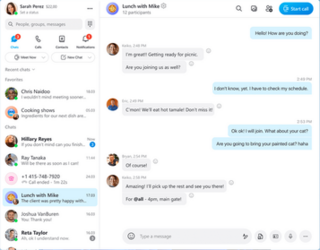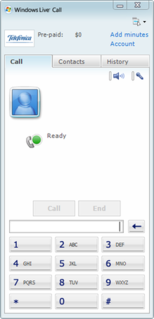
AIM was an instant messaging and presence computer program created by AOL, which used the proprietary OSCAR instant messaging protocol and the TOC protocol to allow registered users to communicate in real time.
Voice over Internet Protocol (VoIP), also called IP telephony, is a method and group of technologies for the delivery of voice communications and multimedia sessions over Internet Protocol (IP) networks, such as the Internet. The terms Internet telephony, broadband telephony, and broadband phone service specifically refer to the provisioning of communications services over the Internet, rather than via the public switched telephone network (PSTN), also known as plain old telephone service (POTS).
Enhanced 911, E-911 or E911 is a system used in North America to automatically provide the caller's location to 911 dispatchers. 911 is the universal emergency telephone number in the region. In the European Union, a similar system exists known as E112 and known as eCall when called by a vehicle.

Yahoo! Messenger was an advertisement-supported instant messaging client and associated protocol provided by Yahoo!. Yahoo! Messenger was provided free of charge and could be downloaded and used with a generic "Yahoo ID" which also allowed access to other Yahoo! services, such as Yahoo! Mail. The service also offered VoIP, file transfers, webcam hosting, a text messaging service, and chat rooms in various categories.

Skype is a proprietary telecommunications application operated by Skype Technologies, a division of Microsoft, best known for VoIP-based videotelephony, videoconferencing and voice calls. It also has instant messaging, file transfer, debit-based calls to landline and mobile telephones, and other features. Skype is available on various desktop, mobile, and video game console platforms.

Skype for Business Server is real-time communications server software that provides the infrastructure for enterprise instant messaging, presence, VoIP, ad hoc and structured conferences and PSTN connectivity through a third-party gateway or SIP trunk. These features are available within an organization, between organizations and with external users on the public internet or standard phones.

A VoIP phone or IP phone uses voice over IP technologies for placing and transmitting telephone calls over an IP network, such as the Internet. This is in contrast to a standard phone which uses the traditional public switched telephone network (PSTN).

Jajah was a VoIP provider, founded by Austrians Roman Scharf and Daniel Mattes in 2005. The Jajah headquarters was located in Mountain View, CA, USA, and Luxembourg. Jajah maintained a development centre in Israel. On 23 December 2009, it was announced that Jajah had been bought by Telefónica through its subsidiary Telefónica Europe. In December 2013, Telefónica announced that Jajah would shut down at the end of January 2014.
Sipgate, stylised as sipgate, is a European VoIP and mobile telephony operator.
This is a comparison of voice over IP (VoIP) software used to conduct telephone-like voice conversations across Internet Protocol (IP) based networks. For residential markets, voice over IP phone service is often cheaper than traditional public switched telephone network (PSTN) service and can remove geographic restrictions to telephone numbers, e.g., have a PSTN phone number in a New York area code ring in Tokyo.
Mobile VoIP or simply mVoIP is an extension of mobility to a voice over IP network. Two types of communication are generally supported: cordless telephones using DECT or PCS protocols for short range or campus communications where all base stations are linked into the same LAN, and wider area communications using 3G or 4G protocols.
Voice phishing, or vishing, is the use of telephony to conduct phishing attacks.
International telephone calls are those made between different countries. These telephone calls are processed by international gateway exchanges (switches). Charges for these calls were high initially but declined greatly during the 20th century due to advances in technology liberalization. Originally they were placed via long-distance operators. The calls were transmitted by cable, communications satellite, radio, and more recently, fiber optics and Voice over Internet Protocol (VoIP). International direct dialling was introduced in the 1970s, so calls can be dialed by country code without an operator.

Windows Live Call was part of Microsoft's Windows Live services. It integrated into Windows Live Messenger to allow users to make PC-to-PC and PC-to-Phone voice and video calls. Microsoft partnered with telecommunication companies around the world to allow users to use a PC equipped with a microphone and speakers and a high speed Internet connection to call almost any regular telephone anywhere in the world.

Jaxtr is a social communications company that melds together global calling, SMS, and social networking. Founded by Phillip Mobin and Touraj Parang in October 2005, jaxtr uses Voice over Internet Protocol to offer competitive rates as well as free international and long distance calling. Some key differentiators for jaxtr in its market include allowing phone-to-phone calls to and from any mobile and landline phones, offering social networking focused on voice, requiring no software downloads or access pins, and giving users local Direct Inward Dialing (DID) phone numbers. Offered in 56 countries, these numbers allow users in those countries to dial a local phone number which would ring a long distance or international destination phone. Jaxtr also offers users a set number of global SMS messages each month.
Iristel is a Canadian provider of Voice over Internet Protocol (VoIP) services that is a competitive local exchange carrier (CLEC). The company was founded in 1999 and is headquartered in Markham, Ontario.
A softphone is a software program for making telephone calls over the Internet using a general purpose computer rather than dedicated hardware. The softphone can be installed on a piece of equipment such as a desktop, mobile device, or other computer and allows the user to place and receive calls without requiring an actual telephone set. Often, a softphone is designed to behave like a traditional telephone, sometimes appearing as an image of a handset, with a display panel and buttons with which the user can interact. A softphone is usually used with a headset connected to the sound card of the PC or with a USB phone.
Viber, or Rakuten Viber, is a cross-platform voice over IP (VoIP) and instant messaging (IM) software application owned by Japanese multinational company Rakuten, provided as freeware for the Google Android, iOS, Microsoft Windows, Apple macOS and Linux platforms. Users are registered and identified through a cellular telephone number, although the service is accessible on desktop platforms without needing mobile connectivity. In addition to instant messaging it allows users to exchange media such as images and video records, and also provides a paid international landline and mobile calling service called Viber Out. As of 2018, there are over a billion registered users on the network.

Upptalk was a proprietary voice-over-IP service and software application that provided mobile phone numbers in the cloud and allows users to call or text any phone for free whether or not the device receiving the calls and texts has the Yuilop application. The service was discontinued in 2017 and even its domain was abandoned.
Obihai Technology is a company that manufactures analog telephone adapters that support Session Initiation Protocol (SIP), XMPP, and Google Voice compatible Internet telephony.








